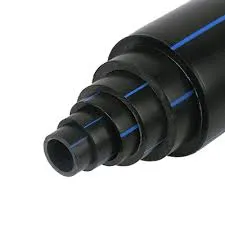Nov . 12, 2024 17:13 Back to list
hdpe sewer pipe
The Advantages of HDPE Sewer Pipe A Comprehensive Overview
High-Density Polyethylene (HDPE) has gained substantial traction in the sewer and drainage industries due to its myriad advantages over traditional materials like PVC and concrete. As urbanization accelerates and the demand for efficient wastewater management grows, understanding the benefits of HDPE sewer pipes has become crucial for engineers, city planners, and environmentalists. This article will delve into the characteristics and advantages of HDPE sewer pipes, showcasing why they are becoming the preferred choice in modern infrastructure projects.
What is HDPE?
High-Density Polyethylene is a thermoplastic polymer made from petroleum. It has a high strength-to-density ratio, which makes it a highly durable material. HDPE is known for its chemical resistance, flexibility, and lightweight, making it suitable for various applications, including packaging, containers, and notably, sewer and drainage pipes.
Key Advantages of HDPE Sewer Pipes
1. Durability and Resistance One of the significant benefits of HDPE sewer pipes is their exceptional durability. These pipes are resistant to a wide range of chemicals, including acids, alkalis, and other corrosive substances typically found in wastewater. Unlike concrete pipes that can degrade over time due to corrosion and chemical attack, HDPE maintains its integrity even in harsh environments. This longevity reduces maintenance costs and ensures uninterrupted sewage systems.
2. Flexibility and Lightweight HDPE pipes are flexible, allowing them to bend and flex without breaking under pressure. This flexibility makes them ideal for installation in a variety of soil conditions and reduces the risk of cracks and breaks. Moreover, HDPE pipes are significantly lighter than traditional materials, which simplifies transportation and reduces installation costs. Workers can handle these pipes more easily, leading to quicker project completions.
hdpe sewer pipe

3. Joint Integrity HDPE sewer pipes feature an advanced jointing system, which provides a watertight seal. The fusion welding process used in HDPE pipe installation creates seamless joints, significantly reducing the likelihood of leaks that can lead to environmental contamination. This joint integrity is especially critical in sewer applications, where the prevention of wastewater leakage is paramount.
4. Environmental Considerations Environmentally friendly practices are becoming increasingly important in civil engineering. HDPE is 100% recyclable, meaning that at the end of its life, it can be reprocessed into new products. Additionally, the energy consumption associated with HDPE production is lower than that of concrete, resulting in a reduced carbon footprint. The longevity and recyclability of HDPE pipes contribute to sustainable construction practices and align with global efforts to minimize environmental impact.
5. Hydraulic Efficiency The smooth internal surface of HDPE sewer pipes minimizes friction, allowing for better hydraulic performance. This feature enhances the flow of wastewater and can lead to reduced pumping energy costs. Efficient flow dynamics are essential in sewer systems, as they directly impact the performance of wastewater treatment facilities.
6. Cost-Effectiveness While the initial investment in HDPE sewer pipes may be slightly higher than traditional options, the long-term savings are significant. The reduced maintenance costs, combined with the longevity and durability of HDPE, make it a cost-effective option over time. Considerations such as installation time, labor costs, and the need for repairs add further economic advantage to the use of HDPE.
Conclusion
In conclusion, HDPE sewer pipes present a compelling solution for modern wastewater management needs. Their durability, flexibility, resistance to chemicals, and environmental benefits make them a superior choice over traditional materials. As municipalities and private sectors invest in sustainable infrastructure, the role of HDPE in enhancing the efficiency and longevity of sewer systems cannot be overstated. With its numerous benefits, HDPE sewer pipes are not just a trend but a future-oriented choice that aligns with the vision of sustainable urban development. As we move forward, continued innovation and adoption of HDPE technology will likely shape the landscape of civil engineering and wastewater management for years to come.
-
Durable PP Rigid Sheet: Lightweight, Chemical Resistant Solutions
NewsAug.21,2025
-
PVC Grey Sheet for Extraction: Chemical Resistant & Durable
NewsAug.19,2025
-
Durable PVC Pipe Fittings for Plumbing & Irrigation Needs
NewsAug.18,2025
-
HDPE Steel Belt Reinforced Spiral Corrugated Pipe | High Strength
NewsAug.17,2025
-
HDPE Pipe Fittings: Durable, Leak-Proof Solutions
NewsAug.16,2025
-
Premium CPVC Sheet: High-Temp & Chemical Resistant Solutions
NewsAug.15,2025

